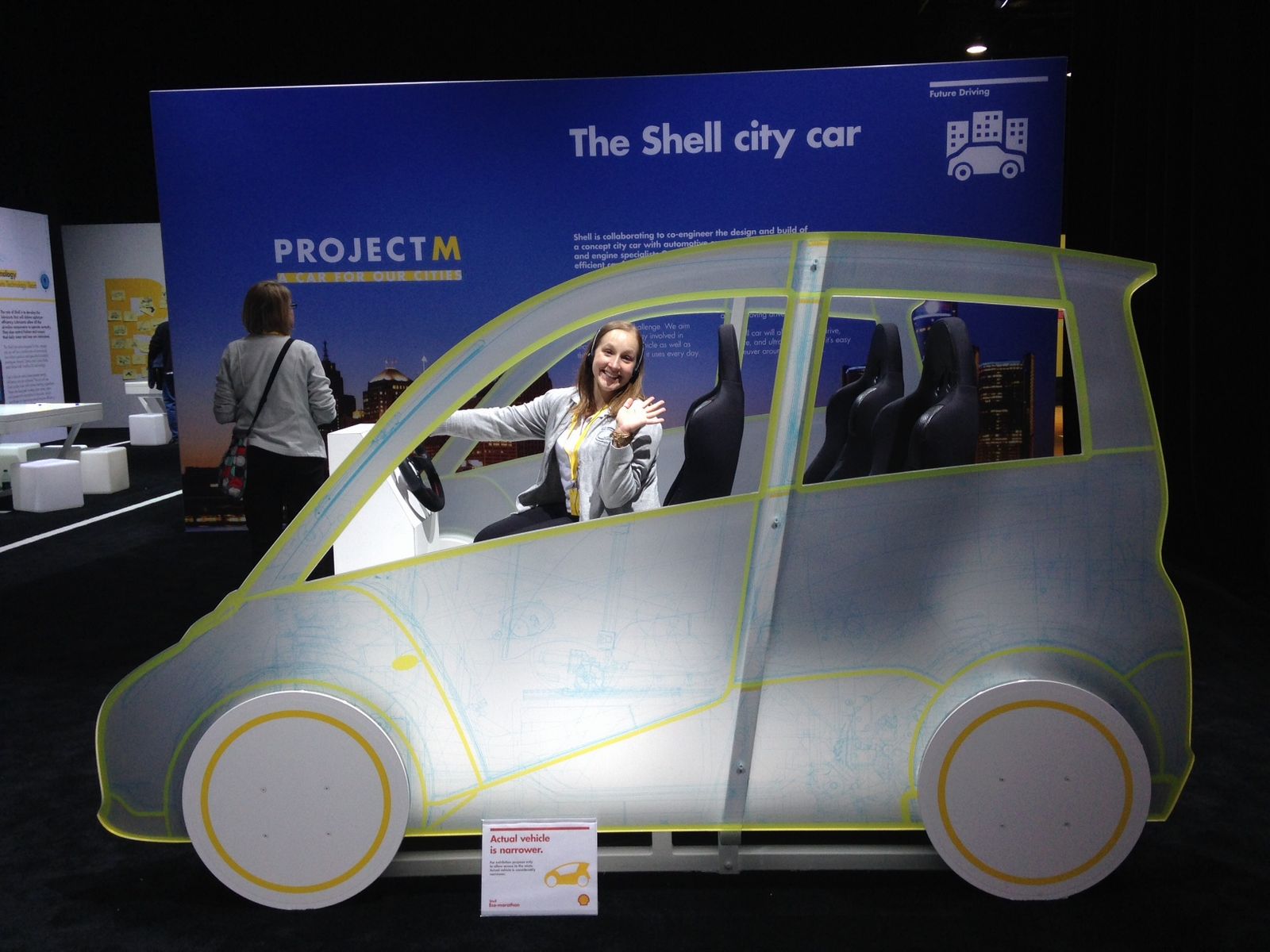Fast cars. Fuel efficiency. Fun. Those words were the theme of a recent event in Detroit. On April 10th NEED proudly partnered with Shell to host a workshop for Michigan teachers at the Shell Eco-marathon Americas in Detroit, Michigan. Nearly 70 teachers from Detroit and beyond came together (during their spring break) to explore the science and energy involved with transportation and smarter mobility, and to check out one of Shell’s most exciting events, the Eco-marathon.
What is Eco-marathon?
Shell’s Eco-marathon is a student challenge in which teams from around the globe design, build, test, and drive highly energy-efficient vehicles. The challenge takes place annually in Asia, Europe, and in the Americas, with this year’s Americas event held in Detroit. The event started within Shell Oil Company in the 1930s, as a friendly wager to see who could travel the furthest, using the same amount of fuel. The challenge has evolved over the years to challenge students, in high school and college, to build vehicles that are ultra-efficient while engaging in research and debate about the future of energy and mobility. Student teams from North America and South America built their own vehicles, using a variety of designs and fuels, in hopes to push the boundaries of fuel efficiency. Student teams must complete a rigorous 10-point inspection before even taking to the track. The winning vehicles produced amazing results, their cars earning a rating equivalent to several hundred mph, but all of the teams showcased an amazing ability to work together and solve a real-world problem. The challenge itself encompasses an entire weekend, but teams work hard for the entire year to make it to the competition. To see the results and specifications for vehicles, and to learn how to get involved, check out https://www.shell.com/global/environment-society/ecomarathon.html.
Teacher Fun
Shell and NEED were happy to welcome teachers and educational leaders to this fun event that showcases innovation and student achievement. Workshop activities focused on the energy involved in transportation and highlighted ways to address these concepts with students of all ages. After a welcome from Karen Labat of Shell, participants “started up” with an activity that explores motors and their components. Participants experimented with mini-motors, learning that electricity and magnetism are the basic components used to start engines. Participants then compared motors and generators to explore their similarities. Each team built the Science of Electricity model found in NEED curriculum and could see that turning the magnets inside a coil of wire induced electrical current in the wire using a digital multimeter.
Next, participants explored the fuels used to power eco-marathon vehicles. One specific fuel available to challengers is hydrogen. Participants formed groups and simulated a fuel cell used in hydrogen cars, with each teacher becoming a part of the chemical process that creates electricity to power a vehicle. In this kinesthetic activity, taken from NEED’s H2Educate curriculum, participants were able to demonstrate the electrochemical conversion of hydrogen and see how water is produced from the reaction.
Participants also played NEED’s Transportation Fuels Enigma This collaborative trivia game allows participants to become familiar with the available transportation fuels, the vehicles and technologies that use them and the potential for each fuel in the future. Teams worked together to conceal the identity of their fuel while uncovering the other team’s identities. Teams scored points for their ability to identify each team’s fuel using the knowledge they gained through the activity.
The final activities in the workshop dealt with conservation of energy in transportation: identifying behaviors that exemplify smarter mobility and choosing a vehicle based on its MPG rating. In Shell’s Get Smart! activity, participants used a pull-back car to explore how weight effects a vehicle’s ability to drive. The activity also encouraged participants to identify smarter driving behaviors. Next, participants each selected a vehicle to explore MPG ratings through NEED’s Pretzel Power. This activity helps students (and teachers!) think carefully about what a gallon fuel is able to do and how to get more out of that gallon.
After a lunch break, teachers were joined by representatives from The Henry Ford to hear about exciting opportunities for teachers and students to tour the museum and stimulate innovation. The exciting end of to the day included a fantastic tour of the Eco-marathon Experience. This interactive tour allowed teachers to experience what the world will be like in 2035. Each participant was given an RFID card that allowed them a personalized look at the future of energy, technology, and mobility through games, quizzes, exhibitions, and demonstrations. The tour experience also allowed visitors to see the challenge teams at work as they assembled and finalized their designs for inspection. Participants were welcomed back to see the challenge vehicles compete on the track and experience more of the tour, as the event was open to the public for the remainder of the weekend.
NEED has been proud to partner with Shell to bring many energy workshops to teachers around the country, and we are glad to have been able to partner with them in this exciting workshop. Participants enjoyed their day and didn’t seem to mind that it was their spring break! It was truly an awesome day at the race, and we look forward to doing it again next year in Detroit!

